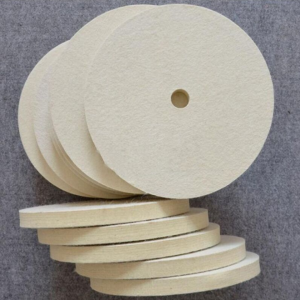The landscape of manufacturing is undergoing a rapid transformation with the advent of smart technologies, and wool felt wheels are now riding the wave of this digital revolution. As industries strive for greater efficiency, precision, and productivity, the integration of wool felt wheels with artificial intelligence (AI) and automation systems is opening up new frontiers in surface finishing processes.
In modern manufacturing facilities, AI – powered robotic arms are increasingly being deployed to handle polishing and finishing tasks with wool felt wheels. These robots are programmed with advanced algorithms that can analyze the surface characteristics of materials in real – time. For instance, when working on complex metal components with irregular shapes, the AI system can detect variations in the surface and adjust the pressure, speed, and angle of the wool felt wheel accordingly. This ensures a consistent and high – quality finish across the entire component, eliminating human errors and reducing the need for rework.
Automated conveyor systems are also being synchronized with wool felt wheel polishing stations. These systems can precisely position workpieces in front of the wool felt wheels, enabling continuous and seamless processing. Sensors are integrated into the setup to monitor the condition of the wool felt wheels during operation. When the wheel shows signs of wear or degradation, the system can automatically replace it, minimizing downtime and maintaining optimal performance.
The data – driven capabilities of AI are further enhancing the performance of wool felt wheels. By collecting and analyzing data from each polishing operation, manufacturers can gain valuable insights into the best practices for using wool felt wheels on different materials and under various conditions. This data can be used to optimize the design of wool felt wheels, such as adjusting the fiber density or hardness, to better suit specific applications. For example, if the data indicates that a particular type of wool felt wheel performs poorly on a certain alloy, manufacturers can modify the wheel’s composition or structure to improve its effectiveness.
In the automotive industry, where large – scale production requires high levels of precision and repeatability, the integration of wool felt wheels with smart manufacturing technologies has been a game – changer. Automakers can now achieve a more uniform and flawless finish on vehicle bodies, reducing the time and cost associated with manual polishing. Additionally, the ability to monitor and control the polishing process in real – time ensures that quality standards are consistently met, enhancing the overall reputation of the brand.
The adoption of smart manufacturing technologies with wool felt wheels is not limited to large – scale industries. Small and medium – sized enterprises (SMEs) are also beginning to embrace these innovations. With the availability of more affordable and user – friendly automation solutions, SMEs can now compete more effectively in the market by improving the quality and efficiency of their surface finishing processes.
As the technology continues to evolve, we can expect even more advanced applications of wool felt wheels in smart manufacturing. The combination of AI, automation, and wool felt wheels is set to redefine the standards of surface finishing, making it faster, more precise, and more sustainable.

Post time: Jun-09-2025
